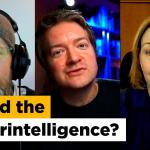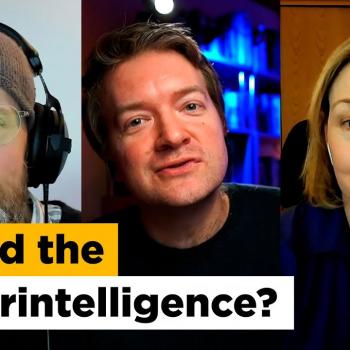
Artificial Intelligence (AI) has become a hot topic in recent years. The dramatic increase in the capability of digital technology has made our lives easier but has also raised important philosophical, ethical, and theological questions. Sadly, as with most innovations, humans dive in before asking, how deep is the water?
Episode two of the current season of The Big Conversation plumbed those depths by featuring a discussion between Prof Nick Bostrom, director of the Future of Humanity Institute at Oxford University and Prof Rosalind Picard, director of the Affective Computing Research Group at MIT. The show explored questions such as: Will AI become conscious? Are we living in a simulation universe? And could technology be the key to immortality?
The Birth of a Dilemma
As a physician, I have seen both the good and bad fruit of technological innovation. I have seen therapies designed to treat disease end up creating more problems than they solved. In vitro fertilization is a prime example. Physicians recognized the suffering caused by infertility and developed a technology that enabled infertile couples to have babies. It has been a tremendous success but has come with significant unanticipated baggage.
When in vitro fertilization was first implemented neonatal units became filled with premature triplets, quadruplets, and even infamous octuplets. Prolonged hospitalizations, associated morbidities, and the long-term health care needs of premature babies increased the emotional and financial demands on parents and the health care system. The immediate medical problems that arose from the implementation of this technology were soon dwarfed by even more concerning ethical and theological issues. What do we do with freezers full of unused fertilized eggs? What does it mean to be a parent, genetically, legally, and emotionally when you use donor eggs, donor sperm and surrogate wombs? The problem has been further compounded by recent advances in molecular genetics. The development of powerful tools for screening and manipulating genes raises the question of what it means to be an image bearer if we can tinker with the genome? Reproductive medicine, which was originally developed to treat infertile couples, is on the verge of becoming a genetic laboratory for the reengineering of humankind.
Medical technology can be a blessing to humankind when it is used to fix us, but it can be a Pandora’s Box when it is used to enhance us. The first view sees humans as occasionally broken, while the other perpetually inferior. AI is no different, because as exemplified by Picard’s work, it can be utilized as an adjunct therapy to treat human disease, yet as both guests pointed out, it also has the potential to change humanity.
Fearfully and Wonderfully Made
I think we need to be very cautious when we try to make humans better in the future when we are barely able to keep them properly functioning in the present. We need to concentrate on restoring humans before we start accessorizing them. One of the problems with technology is that it causes us to get so excited about the future of humankind that we don’t marvel at how fearfully and wonderfully made we are in the present. Interestingly, Picard’s work with Artificial Intelligence has helped her understand the huge chasm between the qualities of the human mind and AI.
“In my work, the more I learn about how the human mind works and how the human emotion system works, I’m just in awe, I’m in awe of how fearfully and wonderfully we are made and it inspires me. Another key piece of my faith is that all people are of equal worth and that has driven my willingness to work on topics with people who are often stigmatized for conditions that other people didn’t value so much.”
Harvesting Original Sin
It seems to me that AI is merely mankind’s ongoing attempt to harvest the Tree of the Knowledge of Good and Evil. Many Bible scholars consider the reference to good and evil to be a ‘merism’ where contrasting words or phrases are used to express totality or completeness, such as heaven and earth referring to the entire universe. Good and evil therefore could refer to all knowledge.
Isn’t that what AI is really all about – the acquisition of all knowledge? I don’t think we can fault image-bearers who only see through a glass darkly for seeking understanding as they try and make their way back to the Garden. However, it becomes a problem when instead of letting the Light of the world guide their steps, they artificially illuminate the wilderness with mortal flashlights which are incapable of shedding enough light to navigate the ethical darkness.
Adam and Eve wanted to expand their vision but forgot that they needed a discerning eye. As their ancestors, we continue to partake of the fruit but instead of settling for a bite of the apple we have brazenly attempted to harvest the entire tree and make a digital cider which because of improper oversight has fermented and left us drunk on our own power. As Clint Eastwood famously said in the movie, Magnum Force – “A man’s got to know his limitations.”
The problem is that we have been so busy acquiring knowledge that we forgot to ask for wisdom as to how to properly use it. Solomon, when he became king, prayed to God for wisdom to discern between good and evil because he knew that knowledge without wisdom was a recipe for disaster. Similarly, we need to ask God for wisdom as to how to use AI properly because when knowledge becomes algorithms that measure ends without contemplating means people get deleted. Ends can be measured objectively but means requires values which cannot be programmed. You cannot digitize wisdom.
Creating AI in our image
As humans with a God complex we can’t help but dabble in creating life. As I mentioned previously, physicians are already in the business of creating biological life in the lab but now we have been joined by computer scientist’s intent on creating digital life in their cubicles. Bostrom believes that this AI could one day develop consciousness.
“Certainly, I think, it is possible in principle to have a digital computational system that would be fully conscious. In fact, indistinguishable from the kind of consciousness we humans have.”
It’s one thing, however, to mold a mind from technological clay and quite another to animate it with divine breath. We may enjoy anthropomorphizing AI but the puppet will never become a boy without a breath of fresh divine air. Picard expressed her skepticism about AI becoming conscious.
“I see AI as not operating on its own. I see it as something we have made and… we are ontologically superior to that which we make.”
The problem for AI is that super computation isn’t consciousness. An interesting article by Thomas Nail in Salon points out that the actual amount of detectable brain activity we put towards specific tasks is 5% of the total. The majority is actually spent in spontaneous activities like dreaming and pondering.
Nail writes:
Furthermore, the cause and pattern of neuron firing are subject to what neuroscientists call “spontaneous fluctuations.” Spontaneous fluctuations are neuronal activities that occur in the brain even when no external stimulus or mental behavior correlates to them. These fluctuations make up an astounding 95% of brain activity while conscious thought occupies the remaining 5%. In this way, cognitive fluctuations are like the dark matter or “junk” DNA of the brain. They make up the biggest part of what’s happening but remain mysterious…What if noise is the new signal? What if these anomalous fluctuations are at the heart of human intelligence, creativity, and consciousness?
Focusing on computational tasks may be algorithmically efficient but will never, to borrow a phrase from Philip K. Dick, allow computers to dream of electric sheep.
Malware
The original sin of trying to be like God will always fail because mortals are incapable of harnessing immortal knowledge. We may dress up AI as an homage to God but in the end humans can’t help but outfit it in the latest Fall fashion.
Are we capable of programming AI without infusing a bit of algorithmic original sin? It’s scary to think that technology, rather than making us more efficient saints, tends to make us more powerful sinners. Instead of computing compassion we upgrade sin with better graphics, more memory, and unprecedented speed. Is it possible to make AI without it being infected by sinful malware?
Karn Evil Revisited
My favorite rock group growing up was Emerson Lake and Palmer. The album that cemented their legacy in the pantheon of progressive rock was Brain Salad Surgery. The stand out track on the album was the song cycle Karn Evil 9 which portrayed the struggle between humans and artificial intelligence. I think the closing lyrics quite nicely distill what is potentially at stake with the development of AI.
Human: I am all there is!
Computer: NEGATIVE! PRIMITIVE! LIMITED! I LET YOU LIVE.
Human: But I gave you life!
Computer: WHAT ELSE COULD YOU DO?
Human: To do what was right!
Computer: I’M PERFECT, ARE YOU?
Are we humans the only true intelligence or will AI join us? Have we become so dependent on AI, that it can rightfully declare, I LET YOU LIVE? Is building digital life the inevitable result of the original sin of wanting to be like God? Can AI claim the moral high ground because it is computationally perfect?
Thankfully, in the stage show, the song concludes with the computer blowing up and the audience erupting in applause over humanity’s victory over technology
While AI may never become truly conscious it still may have the power to enslave us. If we fail to see the big picture we will inevitably outsmart ourselves, therefore, we need to be very careful to not let our digital desires outpace our Christ conformity.
We can kick the ethical tires of AI but this won’t stop science from taking it for a test drive. I hope I am wrong, but my experience in medicine and science has shown that what drives technology is greed, pride, and notoriety, and not ethics. The original sin of being like God elevates technology to the divine right of a King, therefore, I suspect that AI will proceed full speed ahead, damn the ethical torpedoes, and while we may not be able to stop the leaking, we can at least be there to throw Jesus life-preservers to those who are drowning.
In my next blog I will discuss how our infatuation with creating AI has led some to believe that we are actually characters in a computer simulation. In addition, I will address the role of AI in transhumanism.
Click here to watch Professor Rosalind Picard and Professor Nick Bostrom discuss this topic further on The Big Conversation.















